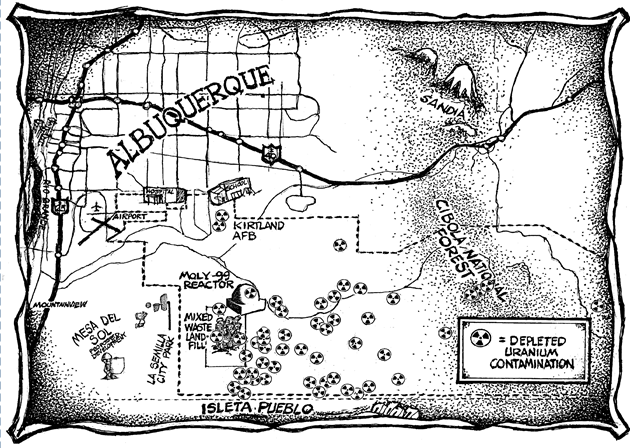
Southwest Research and Information Center
Southwest Research and Information Center is one of 39 environmental and peace organizations that won a landmark lawsuit against the U.S Department of Energy for failure to follow-through on adequate environmental cleanup during its 50+ years of nuclear weapons research, testing, and production. Part of this settlement was the establishment of the MTA Fund (Citizens’ Monitoring and Technical Assessment Fund), which provided $6.25 million for tribes and non-profit organizations to assess and conduct independent technical and scientific studies regarding the multitude of technical, ecological, and health issues surrounding the nation’s nuclear weapons complex.
Clark University was chosen by the non-profit peace and environmental groups as the conservator of these reports to ensure they remain available to the public in perpetuity. The unconventional election of university as conservator is an innovative example, particularly within the era of Web 1.0, of higher education as protector and provider of information through wide dissemination.
The research and reports available in this series were conducted by the Southwest Research and Information Center with their allocated portion of the MTA fund.
If you have any questions or concerns please contact us at digitalrepository@clarku.edu.
-

The Waste Isolation Pilot Plant: How Well is "Accelerated Cleanup" Working?
Don Hancock, Peter Strauss, Gerald Pollett, Beatrice Brailsford, Jeremy Maxand, and Southwest Research and Information Center
This report examines the Performance Management Plans (PMPs) of the six transuranic (TRU) waste sites (Rocky Flats Plant, Hanford, Idaho National Lab, Los Alamos National Lab, the Oak Ridge Reservation, and the Savannah River Site) to the PMP of the Waste Isolation Pilot Plant's (WIPP) (located in southeastern New Mexico) , to see how the WIPP Plan and the major individual site plans relate.
The report also analyzes how well each site and WIPP are meeting the goals and milestones of the plans, discusses how well projected cost savings are justified, and reviews regulatory and other relevant issues. The analysis primarily covers the first two+ years of the plans, updating the information through at least 2004, and in some cases, up to July 2005.
The report includes separate chapters on each of the seven sites and its PMP. Each chapter includes six sections:
* A background briefly describes the site and its mission and role regarding TRU waste.
* The TRU waste inventory is examined by comparing the WIPP PMP with the site PMP, as well as comparing the inventory in other site or official documents.
* Waste shipment projections are compared with the WIPP PMP, the site PMP, and DOE’s Budget Requests to Congress.
* Cost savings provided in the PMP are reviewed and analyzed.
* Regulatory compliance issues regarding TRU waste management are identified and analyzed.
* Other relevant issues are discussed.
-

Uranium Mill Tailings Remediation Performed by the US DOE: An Overview
Paul Robinson and Southwest Research and Information Center
The report summarizes the history and scope of the Uranium Mill Tailings Remedial Action Program (UMTRAP) effort, the current status of UMTRAP sites, on-going ground water remediation efforts, the cost of UMTRAP clean-up projects, estimates of future costs, and United States Department of Energy (DOE) recognition of UMTRAP as a model program.
Uranium mill tailings were among the first hazardous nuclear weapons production legacy wastes to be created as their production go back to 1940s and the places were uranium was first mined and milled in the US. The first several decades of uranium mining and milling were conducted with little or no effort to control radioactive or non-radioactive emissions from uranium mill tailings. UMTRCA established clean up requirements for all US uranium mill tailings sites.
This research was completed money allocated during Round 1 of the Citizens’ Monitoring and Technical Assessment Fund (MTA Fund). Clark University was named conservator of these works.
If you have any questions or concerns please contact us at digitalrepository@clarku.edu


